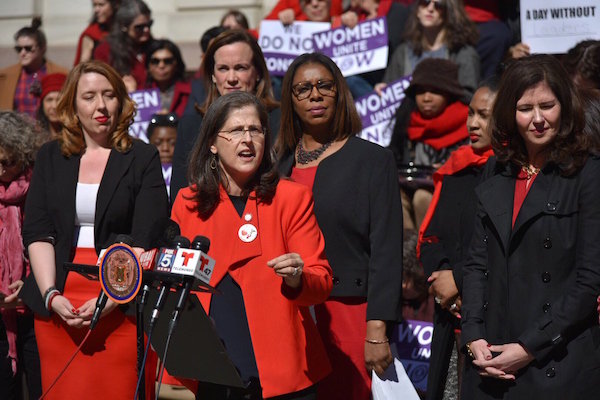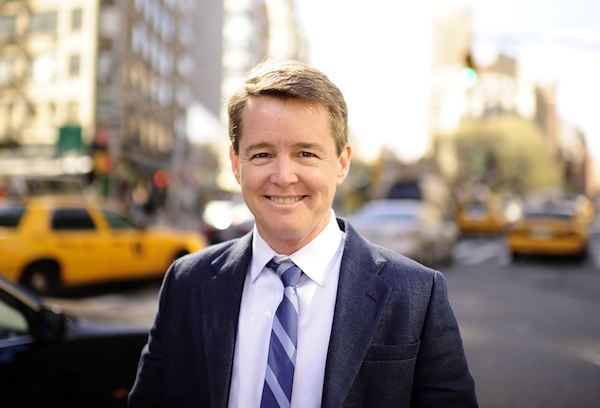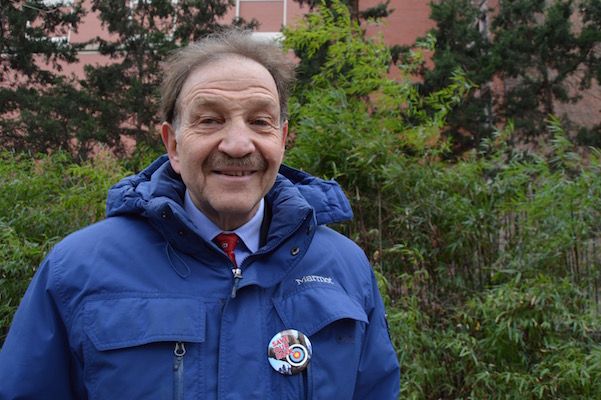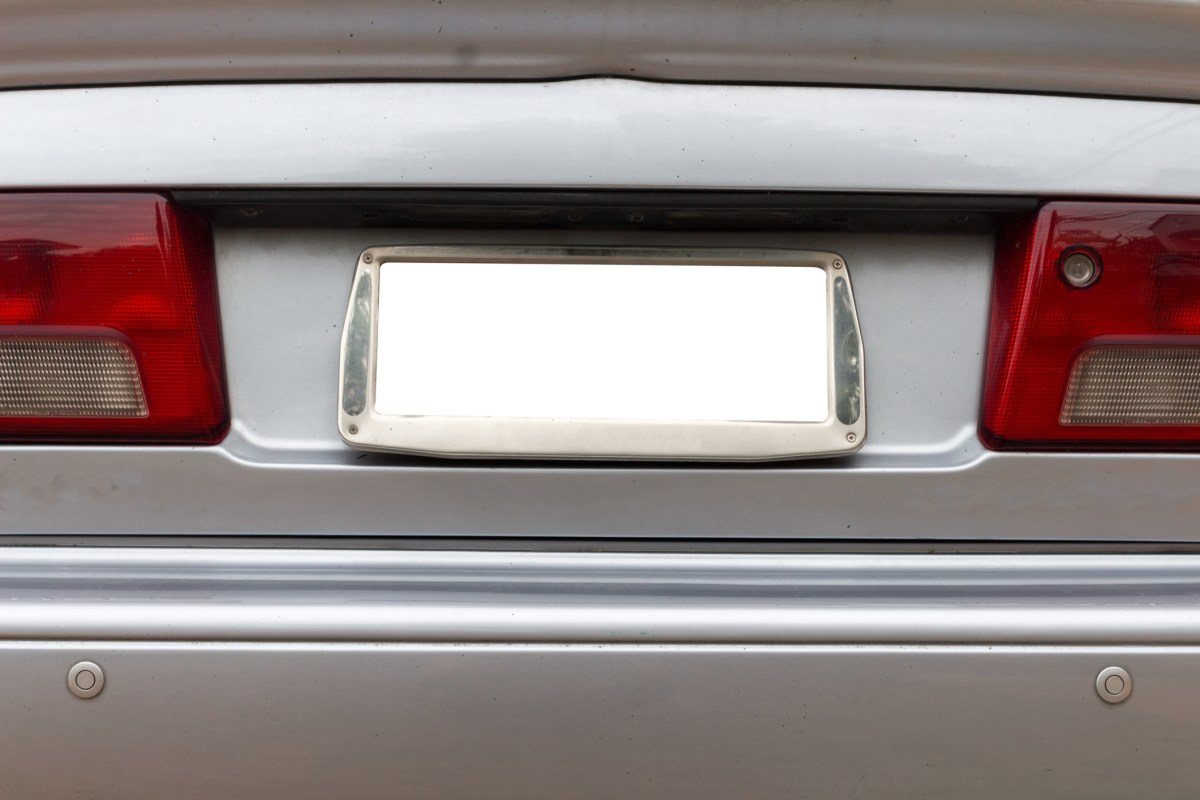
BY PAUL SCHINDLER | The primary election contest for the Upper West Side’s City Council District 6 seat features a rematch between the incumbent and the 2013 runner-up, but it was the third candidate’s main issue that dominated the first portion of an Aug. 17 debate in the three-way Democratic race.
Speaking in a televised debate hosted by Errol Louis on his NY1 “Inside City Hall” program, Cary Goodman argued that despite the fact that the planned $340 million expansion of the American Museum of Natural History will eliminate just a quarter-acre of the surrounding 25-acre Theodore Roosevelt Park, the renowned science institution already controls more than half of the superblock — running from 77th to 81st Sts., between Central Park West and Columbus Ave. — that the museum and the park share. Charging that the “toxic expansion” is being facilitated by $100 million in public funding supported by the incumbent councilmember, Helen Rosenthal, Goodman, saying, “public parks are the glue of democracy,” argued that the expansion threatened what is a treasured “quiet step back” for neighborhood residents.
Goodman, a former schoolteacher and executive director of a Bronx business improvement district, has been an outspoken leader in the fight against the museum’s expansion. The area, the challenger said, “is one of the wealthiest and whitest districts in the city. We are over-privileged with museums and cultural institutions. We don’t need any more.”
Rosenthal defended the expansion plan, saying, “I’m so pleased to be around for this opportunity for the museum to expand on 21st century science, research, and education. I mean, especially now, we need to make sure that our children, that our children’s children are getting accurate information about science.”

Mel Wymore, a longtime local community board member who came in second in the 2013 Democratic primary contest for the District 6 seat. | Photo courtesy of Mel Wymore
The councilmember noted her role in pressing the museum to scale back the expansion slightly so it would encroach on only a quarter-acre rather than a half-acre, a modification she said would save two valued old trees. Pointing to community input on the expansion, Rosenthal said, “They’re not done addressing traffic and congestion.”
The third candidate, Mel Wymore, a longtime local community board member who finished second after Rosenthal in the 2013 Democratic primary, described himself as taking an intermediate position between Goodman’s and Rosenthal’s.
“There are serious things we can do to improve that project,” he said, after lauding the educational virtues of the museum. “We can reduce the size so it doesn’t impact the park at all. We can make sure that it’s sustainable as a model for energy and renewable energy, and we can work hand in hand with all the neighbors and stakeholders to mitigate every impact, any traffic impact and environmental impact.”
Pointing to leadership he took in rebuilding the 59th Street Rec Center and saving Damrosch Park at Lincoln Center, Wymore characterized himself as someone able to bring all sides to the table. Acknowledging that any solution involves compromise, he said, “When people feel heard, they’re okay with not getting everything they want.”
Goodman then complained that the only public hearing on the museum expansion drew no public officials, including Rosenthal, and she responded he had “spent a year and half in front of the museum spreading misinformation.”

The other major point of contention in the debate centered on Rosenthal’s support for the school rezoning plan adopted in District 3 and endorsed by Community Education Council 3, an elected body of local parents. Though other local elected officials did not support the plan — which redrew the lines for a dozen schools between W. 59th and W. 116th Sts. as a new area school building is slated to open this fall — Rosenthal argued that the “elegant” rezoning plan addressed segregation in the neighborhood’s schools that had existed for more than 50 years while easing overcrowding.
“Everyone says, ‘Let’s wait, let’s study it some more,” she said of those who criticized the rezoning plan. “These parents had studied it to death.” Community Education Council 3, Rosenthal insisted, had seized an historic opportunity, with the opening of the new school, to right a zoning scheme long out of balance.
Goodman and Wymore were scorching in their criticism. Pointing out that the rezoning plan left out schools in the district between W. 116th and W. 122nd Sts., which have a far higher percentage of non-white students, Goodman said, “I think it’s a monumental failure of this councilwoman’s tenure.” Rosenthal, he said, does not send her children to public schools, while Goodman, who taught in segregated schools in the Bronx and East Harlem, had. The racial gap between the heavily white schools south of W. 116th St. and those north of there “is not being bridged, not being approached.”
When Rosenthal responded that her district only runs as far north as W. 96th St., so the schools above there are not in her “purview,” Wymore interjected, “That’s a failure in leadership… You need to collaborate with all the leaders in the district and do the groundwork.” Though the incumbent shot back, “You’re creating a yarn,” and charged Wymore was absent from the hundreds of hours of public meetings on the issue, he said, “Real leadership is bringing all these people together, even reaching across district lines if you have to work with another councilmember.”
In questions the candidates posed to each other, the major source of disagreement was over Wymore’s assertion — a key rationale for his challenge to the incumbent — that Rosenthal’s office is unresponsive to constituent complaints.
“Why don’t you answer the phone?,” he asked.
“That’s just factually wrong.” Rosenthal said. “I don’t know who you’re talking to.”
In her opening comments, the incumbent said, “I’m so proud of the work my office has done,” pointing to the recent enactment of tenant protection legislation, measures to assist people with disabilities in gaining access to government services, and her work on the school rezoning.
Wymore, saying, “I love the Upper West Side,” and noting his New York Times endorsement in the 2013 contest, asserted he had not planned to run this year until he observed the large number of empty storefronts, what he sees as the failed school rezoning, and the continued economic squeeze on local seniors and lower income residents.
Goodman, in his opening statement, emphasized not only his opposition to the museum expansion, but also his critique of the continued “immoral” segregation in Upper West Side schools and his sense, as a 66-year-old, that the growing number of seniors are not receiving adequate services from the city.



































